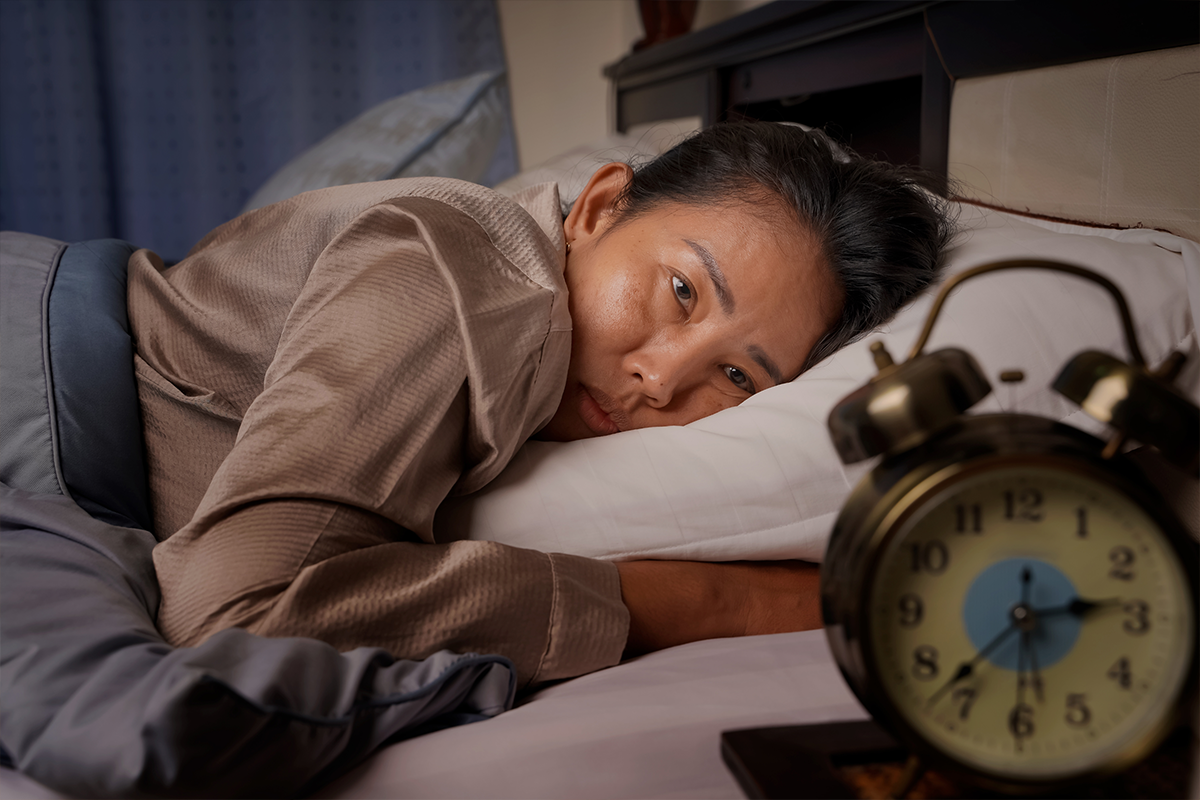Advertisement
Sleepless in Menopause
An a-to-zzz guide

Ah, menopause: the gift that keeps on taking. For 40 to 60 percent of women in perimenopause and menopause, that includes the taking away of deep, restful sleep. What’s going on? And why? (Oh, why?) Most importantly, what can you do if the glowing red numbers on your bedroom clock have you locked in a wide-eyed trance during the dark hours?
Advertisement
The menopause trigger
Although many women experience premenopausal insomnia, the hormone changes during the menopausal transition spark a series of other changes in a woman’s body that make matters worse.
The fall in estrogen parallels a decrease in the ability to fall asleep and stay that way. At the same time, levels of calming and sedative-like progesterone also drop. Some researchers suggest that the menopausal increase of follicle-stimulating hormone and testosterone may also help to put a kink in the sleep/wake cycle.
Along with our reproductive hormones, other hormones that respond to a circadian (daily) rhythm also seem to change at midlife. For example, nighttime concentrations of the sleep hormone melatonin are lower in postmenopausal women.
Advertisement
Here’s a (hot) flash for you
A hot flash is the quick release of heat that keeps your resting body temperature in a healthy range. Between 60 and 80 percent of women experience hot flashes for four to five years during the menopause transition.
While hot flashes typically don’t prevent you from falling asleep, they do a tremendous job of waking you up—sometimes several times a night—and often lead to wakefulness-inducing activities such as changing soaking wet PJs and bed sheets.
Because a hot flash is a temperature disturbance with other possible causes, talk to your health care practitioner about thyroid health. Try 100 percent cotton sheets and PJs, or sleep al fresco to reduce heat and moisture retention.
Advertisement
Daylong sleep strategy
Start getting ready for bed the moment you wake up. Encourage melatonin production by grabbing an eyeful of sunlight first thing in the morning. Sunlight starts the production of a cascade of hormones that eventually become drowsy-making melatonin in the evening.
As we head into shorter days, fool your brain into creating these hormones with light box therapy. Aim for 20 to 30 minutes every morning as you enjoy your breakfast. Be sure to continue this practice through the winter months.
Research suggests that short-wave (blue) light suppresses melatonin release, so it might be wise to limit exposure to blue light from phones and screens after dinner. Some people find wearing blue-blocking glasses in the evening helpful. Turn off overhead lights and enjoy gentle illumination from a candle. Keep your bedroom dark.
Advertisement
Food factors
Remember that everything changes at menopause. Foods and eating habits you’ve had your whole life can suddenly mock you in the middle of the night. Pay attention to foods and mealtimes that impair your ability to get restful sleep.
Some people find that sugary foods (bread, cakes, cookies, candies, alcohol) can wreak havoc on their slumber. Others notice that a protein snack (nuts and nut butters, seeds) right before bed seems to help them get the all-night shut-eye they crave. While a morning cuppa Joe won’t necessarily keep you awake at night, limit caffeine intake to the early hours.
Although they won’t provide enough sleep elixir to send you to dreamland, add food sources of melatonin to your evening meal. Try tart cherries, strawberries, eggs, fish, and nuts such as pistachios and almonds for a melatonin boost.
Advertisement
Serenity now
Research suggests that adjustments in the central nervous system likely precede the body temperature change and hot flash that wake you up at night. Likewise, stress can encourage an active mind when you’re trying to sleep.
During your waking hours, find ways to help calm your nervous system. Avoid people, places, and things that cause you stress. Explore morning yoga, meditation, earthing, and breathwork to find the path to your peaceful place. Acupuncture and massage also help with menopausal insomnia.
Advertisement
To nap or not to nap?
That is the question. Scant research has explored the effect of napping for menopausal insomnia. A recent population-based sleep study indicated that only afternoon napping negatively affected nighttime sleep. Snooze before noon if you need to catch extra Zzzs.
Remember that there isn’t a one-size-fits-all approach to insomnia management. Be willing to try different strategies to discover what works for you.
Lisa Petty, PhD, is a well-being expert for midlife women. She’s done a lot of middle-of-the-night journalling over the years. Sometimes, good ideas come of it. lisapetty.com
Advertisement
Supplemental support for menopausal insomnia
| Supplement | Benefit |
| ashwagandha | may promote daytime calm; take in the evening to promote sleep; may also help ease hot flashes |
| evening primrose | may be helpful for anxiety and mild depression |
| melatonin | take at bedtime to promote sleep; may help with mood disturbances |
| valerian | might improve sleep quality and reduce hot flashes |
| vitex | may provide some relief from hot flashes and irritability |
I’m up now …
If you’re still awake after about 30 minutes, you aren’t likely to fall asleep soon. Rather than getting frustrated, find a way to calmly use the quiet time. Keep the lights low as you journal, meditate, or read a book. If you’re lucky, you’ll get drowsy and be able to catch a few more hours of sleep. On the flipside, you can enjoy some quiet time by yourself as you get an early start on the day.
The significant impact of insomnia
Fifteen percent of menopausal women with insomnia say it substantially affects their quality of life. There is a strong connection between hot flashes, insomnia, and depression.





